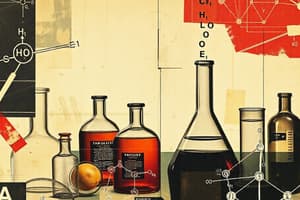Podcast
Questions and Answers
Which form of water is less dense than its liquid phase?
Which form of water is less dense than its liquid phase?
- All forms have the same density
- Solid (correct)
- Liquid
- Gas
What is the pH value of neutral water?
What is the pH value of neutral water?
- The pH value can vary
- 1
- 14
- 7 (correct)
Which compound is considered the most important inorganic compound?
Which compound is considered the most important inorganic compound?
- Water (correct)
- Methane
- Carbon dioxide
- Hydrogen peroxide
Which elements are categorized in groups and periods on the Periodic Table of Elements?
Which elements are categorized in groups and periods on the Periodic Table of Elements?
Which group of elements is the most reactive among metals?
Which group of elements is the most reactive among metals?
Which group of elements is the most reactive among non-metals?
Which group of elements is the most reactive among non-metals?
Which group of elements is the most unreactive?
Which group of elements is the most unreactive?
How many periods are there on the Periodic Table of Elements?
How many periods are there on the Periodic Table of Elements?
Which particles make up an atom?
Which particles make up an atom?
What is the charge of an atom?
What is the charge of an atom?
What are chemical formulas used for?
What are chemical formulas used for?
What are ionic compounds formed between?
What are ionic compounds formed between?
Which type of compounds usually occur between two nonmetals?
Which type of compounds usually occur between two nonmetals?
What is the pH range of acids?
What is the pH range of acids?
What is the pH range of bases?
What is the pH range of bases?
What can chemical reactions result in?
What can chemical reactions result in?
Flashcards are hidden until you start studying
Study Notes
Water Properties
- Ice (solid water) is less dense than liquid water.
pH and Water
- The pH value of neutral water is 7.
Inorganic Compounds
- Water (H2O) is considered the most important inorganic compound.
Periodic Table of Elements
- Elements are categorized in groups (vertical columns) and periods (horizontal rows) on the Periodic Table.
- Metals are categorized in groups 1, 2, and 13-15, whereas non-metals are categorized in groups 14-16.
- There are 7 periods on the Periodic Table of Elements.
Atomic Structure
- An atom is made up of protons, neutrons, and electrons.
- An atom has no charge, as the number of protons (positive charge) equals the number of electrons (negative charge).
Chemical Formulas and Compounds
- Chemical formulas are used to represent the composition of a compound.
- Ionic compounds are formed between a metal and a non-metal.
- Covalent compounds are formed between two non-metals.
Acids and Bases
- The pH range of acids is less than 7.
- The pH range of bases is greater than 7.
Chemical Reactions
- Chemical reactions can result in the formation of a new substance or the release of energy.
Studying That Suits You
Use AI to generate personalized quizzes and flashcards to suit your learning preferences.




